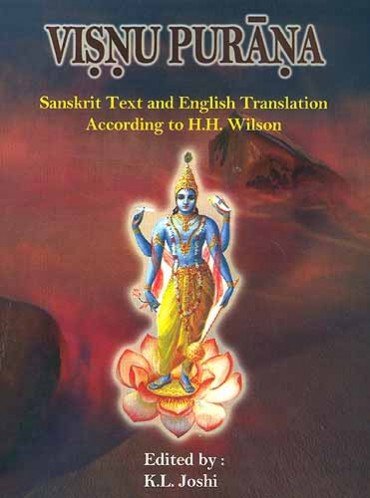The Vishnu Purana
by Horace Hayman Wilson | 1840 | 287,946 words | ISBN-10: 8171102127
The English translation of the Vishnu Purana. This is a primary sacred text of the Vaishnava branch of Hinduism. It is one of the eighteen greater Puranas, a branch of sacred Vedic literature which was first committed to writing during the first millennium of the common era. Like most of the other Puranas, this is a complete narrative from the cr...
Chapter XXXII - Description of Usha the daughter of Bana
Parāśara said:—
I have enumerated to you Pradyumna and the other sons of Rukminī. Satyabhāmā bore Bhānu and Bhairika. The sons of Rohiṇī were Dīptimat, Tāmrapakṣi, and others. The powerful Śāmba and other sons were born of Jāmbavatī. Bhadravinda and other valiant youths were the sons of Nāgnajitī. Śaivyā (or Mitravindā) had several sons, of whom Saṅgrāmajit was the chief. Vrika and others were begotten by Hari on Mādrī. Lakṣmanā had Gātravat and others: and Śruta and others were the sons of Kālindī[1]. Kṛṣṇa had sons also by his other wives, in all one hundred and eighty thousand. The eldest of the whole was Pradyumna, the son of Rukminī: his son was Aniruddha, from whom Vraja was born: his mother was Uṣā, the daughter of Bāṇa, and grand-daughter of Bali, whom Aniruddha won in war. On that occasion a fierce battle took place between Hari and Śaṅkara, in which the thousand arms of Bāṇa were lopped away by the discus of the former.
Maitreya said:—
HOW happened it, venerable Brahman, that a contest on account of Uṣā arose between Śiva and Kṛṣṇa? and in what manner did Hari cut off the thousand arms of Bāṇa? This, illustrious sir, thou art able to narrate.
Parāśara said:—
Uṣā, the daughter of Bāṇa, having seen Pārvatī sporting with her lord, Śambhu, was inspired with a wish for similar dalliance. The beautiful Gaurī, who knows the hearts of all, said to Uṣā, “Do not grieve; you shall have a husband.” “But when will this be?” thought Uṣā to herself, “or who will be my lord?” On which Pārvatī continued; “He who shall appear to you, princess, in a dream on the twelfth lunation of the light half of Vaiśākha, he will be your husband.”
Accordingly, as the goddess had foretold, on that lunar day a youth appeared to Uṣā in a dream, of whose person she became enamoured. When she woke, and no longer perceived him, she was overcome with sorrow, and, unrestrained by modesty, demanded of her companion whither he had gone. The companion and friend of the princess was Citralekhā, the daughter of Kubhāṇḍa, the minister of Bāṇa. “Of whom do you speak?” inquired she of Uṣā. But the princess, recollecting herself, was ashamed, and remained silent. At length, however, Citralekhā conciliated her confidence, and she related to her what had passed, and what the goddess had foretold; and she requested her friend to devise some means of uniting her with the person whom she had beheld in her dream.
Citralekhā then delineated the most eminent gods, demons, spirits, and mortals, and shewed them to Uṣā. Putting aside the portraits of gods, spirits, snake-gods, and demons, the princess selected those of mortals, and amongst them the heroes of the races of Andhaka and Vṛṣṇi. When she came to the likenesses of Kṛṣṇa and Rāma, she was confused with shame; from the portrait of Pradyumna she modestly averted her eyes; but the moment she beheld the picture of his son, the object of her passion, her eyes wide expanded, and all her bashfulness was discarded. “This is he! this is he!” said she to Citralekhā; and her friend, who was endowed with magic power, bade her be of good cheer, and set off through the air to Dvārakā.
Footnotes and references:
[1]:
The Bhāgavata says, each of his eight queens had ten sons, and gives the ten names of each set, with one or two exceptions.
